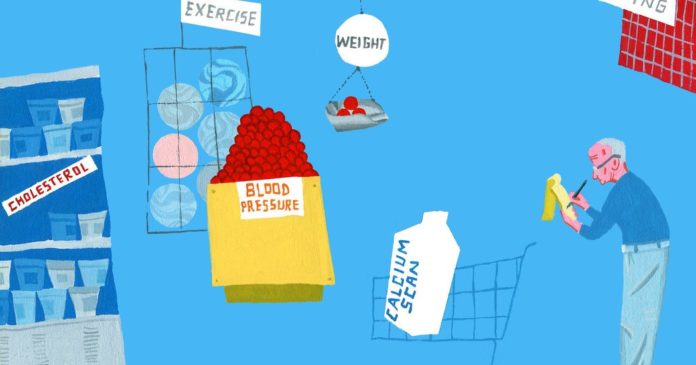A cardiac calcium scan is a specialized type of low-dose X-ray that highlights calcium deposits in the plaque that can line and clog arteries feeding the heart. The more calcium, the more plaque a person is likely to have and the greater the risk of a blockage that can precipitate a heart attack if a piece of plaque breaks loose. The procedure, known as multi-slice computerized tomography, does not require that a dye be injected into the bloodstream to visualize the coronary arteries, though the findings are less precise than those from a CT angiogram, which requires a dye.
A calcium scan is most useful to assess patients considered to be at moderate risk of heart disease, as well as those whose risk is uncertain. Someone who has 5 percent to 7.5 percent chance of suffering a heart attack in the next 10 years, based on standard risk factors like age, gender, race, cholesterol level, blood pressure, smoking behavior and the presence of diabetes, is considered to be at moderate risk. The scan can also be helpful for patients deemed at low risk but with a family history of heart attack at a relatively young age, as in the case of my brother.
Dr. Mandrola, a cardiac electrophysiologist at Baptist Health in Louisville, Ky., recently reviewed both the main benefits and limitations of a cardiac calcium scan. He pointed out that the accepted nonmedical way of assessing a person’s risk of a heart attack — based on standard risk factors — is imprecise and often overestimates the risk of underlying heart disease, although it is frequently used to decide whether the patient should be taking medication, like a statin to lower cholesterol.
But when findings on a calcium scan are combined with the presence of these traditional risk factors, the result gives a clearer picture of a person’s risk of suffering a heart attack in the next decade. Also, if the calcium score is zero, it might mean the person can safely skip taking a statin or other heart-protective medication.
On the other hand, Dr. Mandrola suggested, if the scan shows calcium deposits, it might motivate some people “to make healthy lifestyle changes.” As shown in one analysis of six studies involving 11,000 patients, those told they had coronary calcium were two to three times more likely than those with zero calcium to start taking a baby aspirin or a drug to lower cholesterol or reduce blood pressure and to adopt heart-saving behaviors like quitting smoking or exercising more.
A calcium score of 1 to 99 is considered indicative of mild disease; a score of 100 to 399, moderate disease; and a score of 400 or higher, severe disease.
But measuring coronary calcium is not a surefire indication of a person’s risk. For one thing, the test measures arterial plaque that is hardened and firmly attached to the lining of coronary vessels. It does not measure the soft plaque that can rupture and travel through the coronary circulation until it reaches a narrowing it cannot pass, leading to a heart attack or stroke.
Dr. Udo Hoffmann, a radiologist at Massachusetts General Hospital and Harvard Medical School in Boston, told me, “Coronary calcium does indicate the extent of coronary disease. If there’s a lot of calcium, there’s likely a lot of atherosclerosis in general and a greater chance of a seriously narrowed artery or plaque that is vulnerable to rupture.” However, he said, even a person with no coronary calcium and very little atherosclerosis could still have a small area that can spell future trouble.
In other words, having zero coronary calcium is not a license to ignore well-established cardiac risk factors like elevated cholesterol and blood pressure, smoking, overweight and a sedentary lifestyle. “It’s not a ticket to be reckless, but it can help reduce a person’s anxiety about their risk of a heart attack,” Dr. Hoffmann said. “The calcium score is a risk assessment tool, helpful in tailoring medical therapy, diet and exercise.”
There is still no definitive evidence from randomized controlled clinical trials to show that patients with elevated calcium scores who are treated to lower their risk actually experience a reduced rate of cardiac events. Researchers at Wake Forest School of Medicine have calculated that it would require a costly trial of about 30,000 people deemed to be at a low-intermediate risk of a future heart attack to show such a benefit.
Source : Nytimes












